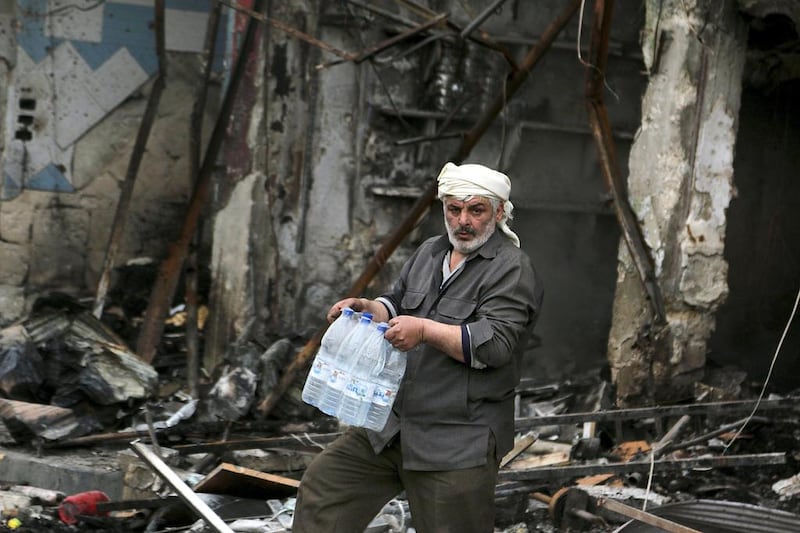KUWAIT CITY // United Nations agencies are calling for a long-term approach to helping Syrian refugees as aid organisations and government representatives meet on Tuesday to raise funds for the millions of civilians affected by the country’s civil war.
With the conflict now in its fifth year, focusing on an emergency response alone is no longer feasible. Instead, aid agencies say, donors must realise that the focus needs to be on more sustainable assistance.
“There seems to be no light at the end of the tunnel,” said Jens Laerke, spokesperson for the United Nations humanitarian office (OCHA).
Kuwait has hosted the annual donors’ conference, which is unique for bringing together a large numbers of donors and aid organisations, and the large sums of money pledged, for the past two years. The Emir, Sheikh Sabah Al Ahmed Al Jaber Al Sabah, is expected to address this year’s gathering, as will the UN secretary-general Ban Ki-moon.
In the 2013 and 2014 conferences, about US$4 billion (Dh14.7bn) was pledged – Kuwait itself pledged $300 million two years ago and $500m last year.
Though other aid organisations attend the conferences, the UN has a dominating presence. This year, it has appealed for a record $8.4bn for its Syria operations, both inside and outside the country.
There are now 3.9 million refugees registered with the UN. There are believed to be about eight million internally displaced Syrians.
Thousands more refugees are believed to be unregistered.
More than 200,000 Syrians have been killed since the uprising began in March 2011.
For the coming year, the UN has drawn up what it calls a Regional Refugee and Resilience Plan that will see more support given to countries hosting the refugees, mainly Turkey, Jordan and Lebanon.
The plan will focus on development projects in these countries, as well as within Syria, such as putting up more long-term housing instead of tents, and providing better living conditions.
“We didn’t think the war was going to last more than a few years,” said Dalal Abdulrahman Al Radhi, a Kuwait-based employee of UN Habitat.
She said it was difficult for refugees to live in tents winter after winter, and her agency planned to build large numbers of prefabricated units to house families of up to eight people.
The UN also aims to increase indirect aid by helping host countries manage schools, infrastructure, water and food supplies and health care.
“The meeting in Kuwait, we need this to be a clear demonstration of international burden sharing, of international commitment to countries like Jordan ... that they are not by themselves,” said Andrew Harper, head of UNHCR, the UN refugee agency, in Jordan.
However, UN agencies are concerned about whether they will receive enough funding to provide long-term support for Syrians. The World Food Progamme has already had to scale back operations in Turkey and Jordan due to a lack of funds.
“What we are concerned about as we go into 2015 is we’re seeing donor fatigue,” said Mr Harper. “We’ve seen donors lose interest in what is becoming an intractable problem. No one wants to talk about a situation that they can’t influence any more.”
Participants in the conflict have defied attempts to reach a political solution, and extremism is on the rise.
In such an environment, some might be sceptical as to how effectively donations will be spent, but aid workers remain hopeful about the pledges that will be made at this year’s conference.
Donors can pledge towards the general appeal or to a particular UN agency and its affiliated NGOs, in which case the donor enters into an agreement with the beneficiary organisation.
A self-reporting system for donors and aid agencies is supposed to allow the UN to track whether the funds pledged are delivered.
“Ideally both [report the donations] but this does not always happen,” said Mr Laerke of the UN humaitarian agency.
The UN tries to follow up, but there are only three employees in its financial tracking system, he said.
Even if keeping track of the funds is a chaotic process, international aid workers make clear the need is great.
“In an environment of increased radicalism and increased vulnerabilities, now is the time to engage people who have lost everything and give them an opportunity for the future,” said Mr Harper.
Chris Gunness, spokesman for the United Nations Relief and Works Agency – a Palestinian aid agency – said unless donors respond, his organisation will likely lose a cash assistance programme that helps Palestinians in Syria who have been displaced.
“If at this conference we do not receive money, we are going to be forced to suspend our cash assistance programme in Syria ... and it is a matter of life and death for many people to be able to have this,” he said.
jvela@thenational.ae





